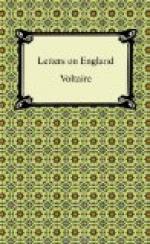Neither Montaigne, Locke, Bayle, Spinoza, Hobbes, the Lord Shaftesbury, Collins, nor Toland lighted up the firebrand of discord in their countries; this has generally been the work of divines, who being at first puffed up with the ambition of becoming chiefs of a sect, soon grew very desirous of being at the head of a party. But what do I say? All the works of the modern philosophers put together will never make so much noise as even the dispute which arose among the Franciscans, merely about the fashion of their sleeves and of their cowls.
LETTER XIV.—ON DESCARTES AND SIR ISAAC NEWTON
A Frenchman who arrives in London, will find philosophy, like everything else, very much changed there. He had left the world a plenum, and he now finds it a vacuum. At Paris the universe is seen composed of vortices of subtile matter; but nothing like it is seen in London. In France, it is the pressure of the moon that causes the tides; but in England it is the sea that gravitates towards the moon; so that when you think that the moon should make it flood with us, those gentlemen fancy it should be ebb, which very unluckily cannot be proved. For to be able to do this, it is necessary the moon and the tides should have been inquired into at the very instant of the creation.
You will observe farther, that the sun, which in France is said to have nothing to do in the affair, comes in here for very near a quarter of its assistance. According to your Cartesians, everything is performed by an impulsion, of which we have very little notion; and according to Sir Isaac Newton, it is by an attraction, the cause of which is as much unknown to us. At Paris you imagine that the earth is shaped like a melon, or of an oblique figure; at London it has an oblate one. A Cartesian declares that light exists in the air; but a Newtonian asserts that it comes from the sun in six minutes and a half. The several operations of your chemistry are performed by acids, alkalies and subtile matter; but attraction prevails even in chemistry among the English.
The very essence of things is totally changed. You neither are agreed upon the definition of the soul, nor on that of matter. Descartes, as I observed in my last, maintains that the soul is the same thing with thought, and Mr. Locke has given a pretty good proof of the contrary.
Descartes asserts farther, that extension alone constitutes matter, but Sir Isaac adds solidity to it.
How furiously contradictory are these opinions!
“Non nostrum inter vos tantas componere lites.”
VIRGIL, Eclog. III.
“’Tis not for us to end such great disputes.”
This famous Newton, this destroyer of the Cartesian system, died in March, anno 1727. His countrymen honoured him in his lifetime, and interred him as though he had been a king who had made his people happy.




